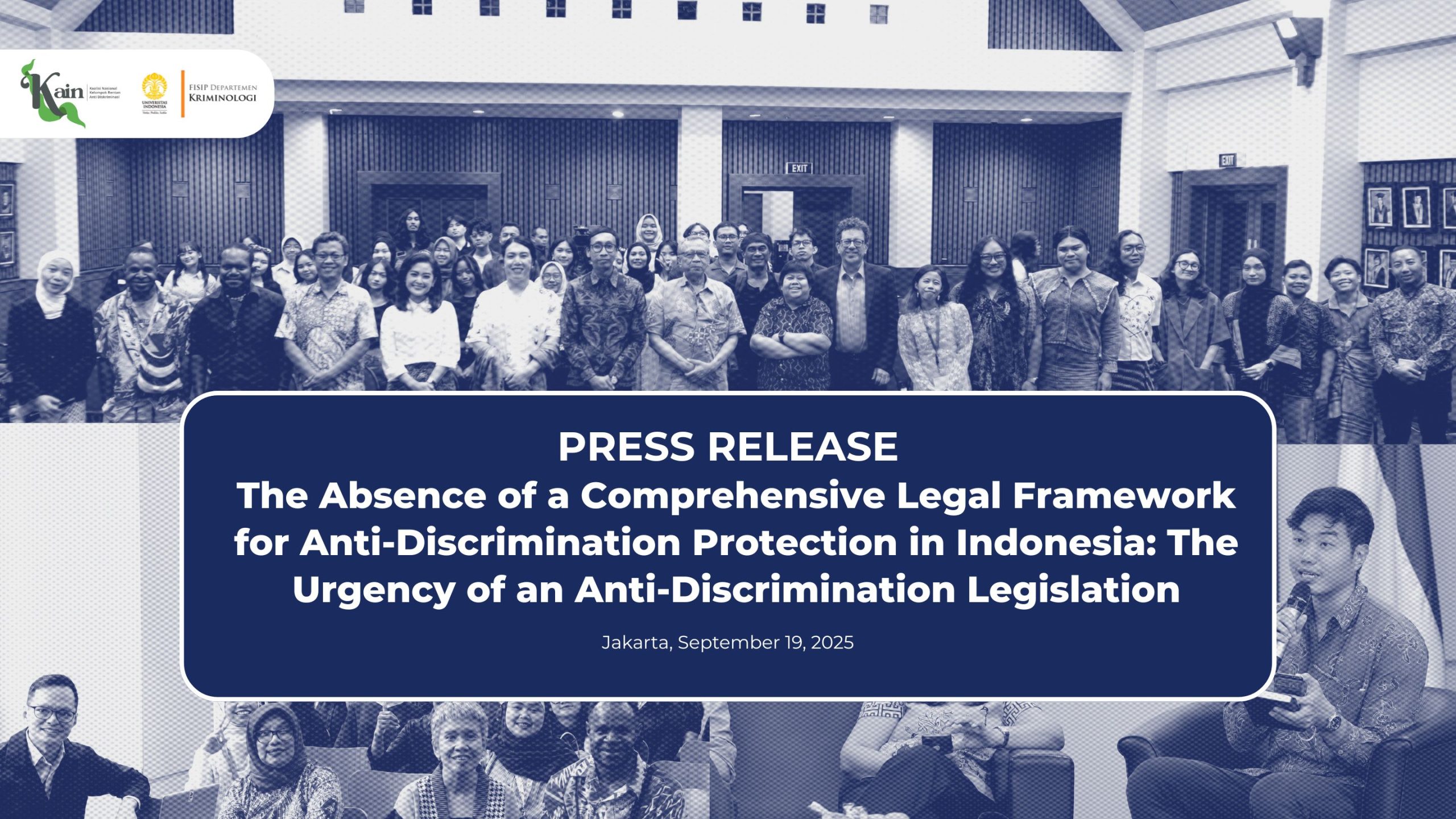The Absence of a Comprehensive Legal Framework for Anti-Discrimination Protection in Indonesia: The Urgency of an Anti-Discrimination Legislation
Discrimination continues to be a pressing issue faced by People Living with HIV (PLHIV) and Key Populations, Sexual Orientation and Gender Identity and Expression (SOGIE) communities, persons with disabilities, Indigenous peoples, women, adherents of faith and belief systems, and many other vulnerable groups. The root of the problem lies in existing policies that are partial in scope, provide limited and stagnant recognition of vulnerable identities, and remain closed-ended. As a result, the number of victims of discrimination continues to rise, while at the same time, the current legal system has yet to effectively respond to these challenges.
This discourse encouraged the National Coalition of Vulnerable Groups Against Discrimination (KAIN) and the Department of Criminology, Faculty of Social and Political Sciences, University of Indonesia (FISIP UI), in collaboration with the Office of the United Nations High Commissioner for Human Rights (OHCHR) and the Equal Rights Trust (ERT), convened the National Symposium on the Draft Bill on the Elimination of Comprehensive Discrimination (RUU PDK). The symposium was held on 16–17 September 2025 at the Department of Criminology, FISIP UI, and gathered more than 150 participants, bringing together strategic stakeholders and various groups consisting of academics, international experts, representatives of ministries/ institutions, civil society actors, foreign embassies in Indonesia, media/journalists, and students.
This symposium was born out of the need for evidence-based regulation, policies that are needs-based and problem-solving oriented, and a genuine aspiration for a law that guarantees comprehensive protection for every citizen without exception. Furthermore, this event was the initiative of civil society coalitions to remind the state of its commitments in the Universal Periodic Review (UPR) Cycle IV of 2023 and the 2024 Concluding Observations of the Human Rights Committee on Civil and Political Rights, in which the Indonesian government agreed to anti-discrimination legislation.
The Dean of FISIP UI, Prof. Semiarto Aji Purwanto, opened the symposium by emphasizing that discrimination not only impacts individuals but also undermines social cohesion and threatens political legitimacy. He stressed that comprehensive anti-discrimination law must go beyond written text to serve as a real instrument of justice, especially for the vulnerable and marginalized who have long been excluded from state protection. Similarly, Claude Cahn of OHCHR stated: “With just one law, the state can fulfill many of its international human rights obligations. This law gives people a direct tool to fight discrimination. Rights that are usually written only in constitutions or international treaties may feel distant, but with this law, people can use them in their daily lives.”
During the first plenary session, Dr. Raden Siliwanti, M.PIA, Expert Staff for Development Financing Innovation at the Ministry of National Development Planning/Bappenas, emphasized that anti-discrimination legislation aligns with Indonesia’s national development framework. In the National Long-Term Development Plan (RPJPN) 2025–2045, one of the policy directions is to ensure that no one is left behind in development. Two pillars supporting this are the rule of law and access to justice. This reference should be understood as a mandate enabling stakeholders to follow up on international recommendations for Indonesia.
To examine the RUU PDK in greater depth, the symposium featured four thematic panel discussions.
Panel 1 explored definitions and the scope of discrimination, emphasizing that discrimination arises from failures to recognize diversity, and that its essence is injustice toward diversity. Accordingly, the bill must be based on protected grounds and adopt an open-ended definition.
Panel 2 with the theme of enforcement mechanisms for accountability and victim redress. This theme highlights the ideal law enforcement mechanism in the bill, which is carried out through the establishment of a new independent, inclusive, participatory, participatory body/institution that represents various vulnerable and minority groups, sufficiently resourced, and staffed with individuals of integrity and sensitivity to discrimination issues. This mechanism must be able to respond to all incidents of discrimination with processes that provide convenience, reliability, and certainty. They must ensure the enforcement and restoration of victims’ rights in an accountable, effective, comprehensive, and inclusive way.
Panel 3 highlighted effective prevention measures to prevent discrimination need to include data collection for policy-making, meaningful participation of vulnerable groups in decision-making, access to justice, and the establishment of individual complaints systems. Preventive measures must be grounded in international principles and local norms that uphold diversity and be implemented through the mandates of human rights institutions, law enforcement agencies, education, culture, and local government.
Panel 4 delved into the effective implementation of comprehensive anti-discrimination legislation. The critical components of implementation are ensuring independent enforcement bodies/institutions and conducting regulatory audits to assess the impact of the Anti-Discrimination bill .
The symposium concluded with remarks by Ratna Batara Munti, Commissioner and Vice Chair of the National Commission on Violence Against Women (Komnas Perempuan), who declared full support for KAIN’s initiative to push for Indonesia’s adoption of the RUU PDK. She reaffirmed that Komnas Perempuan will actively advocate for the inclusion of the bill in the National Legislative Program (Prolegnas) priority agenda of the House of Representatives (DPR), and ensure it is deliberated and passed, using Komnas Perempuan’s mandate, functions, and authority.
Contact Persons:
Arul (KAIN) – +62 822 2406 1490
Iswan Sual (KAIN) – +62 897 8534 135
